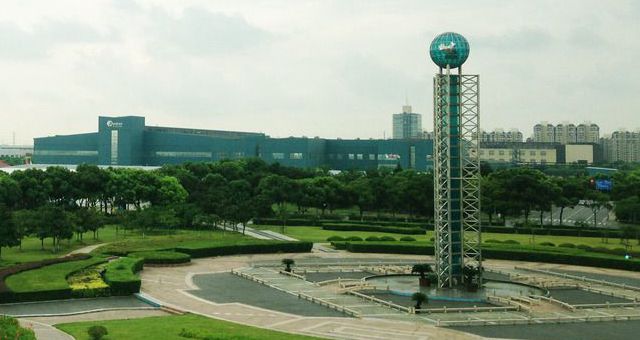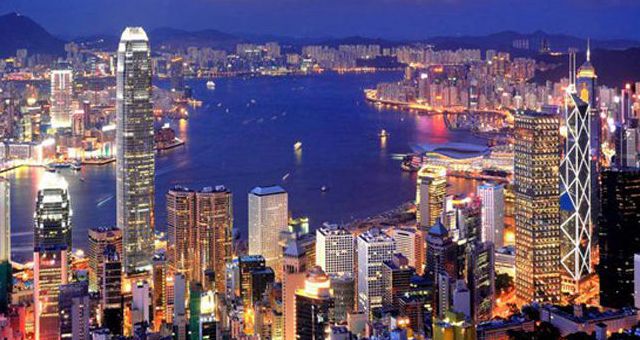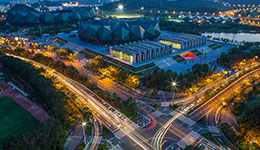
Binhai New Area Cultural Center opened in TJFTZ
Located in Tianjin Pilot Free Trade Zone, the Binhai New Area Cultural Center is a comprehensive facility that combines a library, a show center, an exploration hall, a citizen activity center and a cultural corridor. The external architecture of the cultural center is eye catching and, in a word, astonishing.In the library, the most prominent feature is the spherical multi-functional hall. The outside of the hall is covered with 400,000 LED lights and the interior is perfectly designed to play movies. That is why the library is also called "The Eye of Binhai". Inside, the hall can hold lectures and seat up to 200 people. The library has 1500 seats in its reading area and its collection is expected to reach 1,350,000 books. The book collection includes both paper and digital editions and can meet people's needs for reading around the clock. Book sales and events such as book signings and reading salons will be regularly held in this part of the library.
Shanghai highlights its plans for free trade port and science center
The free trade port, based on the city’s pilot free trade zone, has entered the planning stage and will be implemented after approval from central government, Han told a press conference on the sidelines of the Party’s 19th National Congress in Beijing.The government approved a plan to comprehensively expand the opening-up of the China (Shanghai) Pilot Free Trade Zone in May. Han said that marked the “3.0 version” of the FTZ following its establishment in 2013 and the first growth in its opening-up in 2015.“Through years of reform, there have been over 100 innovative institutions promoted nationwide,” Han said.The Ministry of Commerce has announced the launch of another seven free trade zones, taking the nation’s total to 11.As China’s first FTZ, the Shanghai zone has gained experience that will inform the development of the other zones.Another major task for Shanghai is to accelerate the development of a scientific innovation center with “global influence,” Shanghai Mayor Ying Yong told reporters.“The city government has decided to form a central basic framework of the scientific innovation center by 2020 and form its core function by 2030,” Ying said.As a core part of the plan, the city will establish a Zhangjiang Comprehensive National Scientific Center in the Pudong New Area, which will involve a batch of world cutting-edge major scientific facilities as well as world-leading research institutes and innovation groups, Ying said.To achieve that goal, Shanghai has planned a Zhangjiang Science City covering 94 square kilometers, which aims to be on a par with California’s Silicon Valley, Singapore’s One North science park and Japan’s Tsukuba scientific town, according to the Shanghai Planning, Land and Resources Administration.Ying said the city government has issued a set of guidelines to support foreign research and development centers based in Shanghai to play their part in the city’s scientific innovation center ambitions.More policies will be issued to create a “highland for professionals” as well as serve the scientific innovation center, Ying added.“Shanghai is in more urgent need than in any other period of talent,” he said.At present, more than 610 global or regional headquarters of multinational companies have been set up in Shanghai along with over 418 research and development centers, according to the government.Reporters were also told by Han that the city banned close family members of senior government officials from running businesses in a pilot regulation launched in May 2015 ahead of a nationwide rollout. Regular investigations will be launched to check at least 20 percent of local officials, Han said.He also promised to further improve air quality in the city by reducing the density of hazardous PM2.5 fine particles to 40 micrograms per cubic meter this year from 45mg last year.Han said the security of city residents was of top concern.“We have put how to eliminate safety risks as our daily focus to ensure the life and property safety of the people,” he said.
Hunan to Promote Investment
The Hunan Provincial Government recently published a Notice on Promoting and Attracting Investment which presented its new guidelines for investing, implementing national policies, and carrying out its strategy of ‘innovation-driven development’ and promoting Hunan via ‘opening up’.There are 22 sections concerning four areas: new investment promotion measures; investment related policies; improving the investment environment; and strengthening organization and services.Hunan government will encourage enterprises to invest in Hunan public service PPP (public-private-partnership) projects; encourage various levels of government to coordinate funds in support of major investment projects; and, encourage local governments to award or subsidize administrative and institutional urban construction fees for important industrial and innovation investment projects.Priority will be given to guaranteeing essential production factors, such as water, electricity, and gas for key industrial projects; introducing more industrial parks to be included in the national pilot incremental distribution network; encouraging businesses in industrial parks to be involved in direct electricity transaction; and, providing proper logistics subsidies for important projects according to local situations.It prioritizes providing land for the projects involved in the national Catalogue for the Guidance of Industries for Foreign Investment; the Catalogue for the Guidance of Advantage Industries for Foreign Investment (Hunan section); and, the Hunan Catalogue for the Guidance of Key Industries for Investment Promotion.Foreign-funded enterprises are encouraged to be listed on the main board, small and medium-size enterprise board, growth enterprise board (GEB), and international board, according to laws and regulations. The listed enterprises will enjoy the similar preferential policies as domestic ones.
Guangdong FTZ Regulation encourages innovation
The Guangdong FTZ Regulation will come into effect since July 1. "The most important thing in the Regulation is to encourage innovation by law protection," said by Liu Yuelun, vice chairman of the Standing Committee of Guangdong Provincial People's Congress on a conference on promoting the Regulation. In short, citizens, legal persons and other organizations are encouraged to make innovations in Guangdong FTZ only if their projects haven't been prohibited by law. According to Liu, "Guangdong FTZ initiates the fault tolerance mechanism for innovation." For instance, if a customs clearance agency launched a measure to collect shipping companies' file with big data and aims to provide 5,000 companies' information for customs departments each year. However, that company couldn't finish that goal, it won't be blamed or punished since that innovation does bring some revolutionary progress. The Regulation also gives priority for cooperation among Guangdong, Hong Kong, Macao and the countries along “Belt and Road”. On the one hand, service trade facilitation between Guangdong and Hong Kong, Macao will be promoted. On the other hand, Guangdong FTZ will further its opening up and seek cooperation with FTZs, countries along the Belt and Road in finance, shipping, tourism and other fields. Other highlights in the Regulation include administrative system, investment and trade facilitation and opening, promotion of high-end industries, financial innovation, etc.
The Investment Guide for Guangdong
Guangdong Province is located in the southernmost part of China’s mainland, facing the South China Sea and neighboring Hong Kong and Macau, with beautiful landscape and pleasant weather.Guangdong, also known as “Canton (Yue)”, boasts a long history. As a famous cultural city with a history over 2,200 years, the capital city, Guangzhou, is also the starting point of the the ancient Maritime Silk Road. Since the Reform and Opening Up of China, Guangdong has witnessed a rapid economic and social development,with springing up of the miracle of Shenzhen. The economic aggregate of Guangdong has successively exceeded that of Singapore, Hong Kong and Taiwan, three of the “Four Asian Tigers”. Today, Guangdong is one of the regions in China that boast the most developed economy, the most vigorous market and the most attractive investment destination. Guangzhou and Shenzhen stand side by side with Beijing and Shanghai as the global metropolitans in China. Nowadays, Guangdong is burgeoning energy for future innovation and development.Currently, Guangdong is accelerating the pace in shifting its driving forces for development and furthering industrial transformation and upgrade. Guangdong is actively rolling out a new round of high-level opening up to create a more globalized and convenient business environment that is better governed by the rule of law, further relax the threshold restrictions for foreign capital access to industries such as services and manufacturing, and grant greater support to high-level professionals to start their own businesses in Guangdong. Meanwhile, the province spares no effort in building the Guangdong Pilot Free Trade Zone into a gateway hub with a high level of opening up, joins hand with Hong Kong and Macau to promote the development of world-class city clusters in the Pearl River Delta region and the Guangdong-Hong Kong-Macau Great Bay Area, and boosts the development of the Greater-Pearl River Delta Economic Region. All these efforts ensure greater potential for enterprises both at home and abroad to start up business and develop in Guangdong.Guangdong is the place where the Cantonese culture was born and prospers and where China's Reform and Opening Up first started. People who live here are inclusive, practical, open-minded and innovative. Guangdong is not only an attractive destination for investment but also an ideal place for living. Standing at the new historical starting point, we look forward to joining hands with friends from China and overseas countries and regions to start a new page of even greater success. We warmly welcome investors from home and abroad to Guangdong for mutually beneficial cooperation and a bright future!
Anhui Plans to Make Economy More Digitalized
China's booming digital economy had been serving as a major engine for the country's economic growth.China's digital economy surged 18.9 percent in 2016 to 22.6 trillion yuan (3.35 trillion U.S. dollars), according to a white paper issued by China Academy of Information and Communications Technology (CAICT), Ministry of Industry and Information Technology (MIIT).The expansion was much faster than that of China's overall economy, which grew 6.7 percent in 2016.Digital economy accounted for 30.3 percent of China's total gross domestic product (GDP) over the year, said the white paper. Taking its spillover effect into account, digital economy contributed 69.9 percent to the GDP in 2016, it added.Digital economy, also known as the Internet economy, is based on digital computing technologies, comprising new business models such as e-commerce, cloud computing and payment services.Technology is functioning as a driver of revenue and enabler of new business models for many Chinese companies, including China e-commerce giants Alibaba and JD.com.China's digital economy grew significantly higher than the overall economy, becoming a major engine of growth, said the paper.CAICT expects China's digital economy to be valued at 32 trillion yuan and account for 35 percent of the whole GDP by 2020, before taking up over half of the country's GDP by 2030, according to the white paper.China has made a point of promoting digital economy as part of its measures to upgrade the economy, and the central and local governments had identified digital economy as "major development strategy."At the G20 Hangzhou Summit in 2016, China put digital economy high on the agenda, making it part of the G20 Blueprint on Innovative Growth for the first time.In March this year, Report on the Work of the Government called for more efforts to deepen the development of "Internet Plus" and accelerate the growth of digital economy. This is the first time that "digital economy" was referred to in such a report.And the central government is to formulate and issue a strategic plan for promoting digital economy, according to the State Council executive meeting held on July 12.Local governments had also geared up for digital economy, with Guizhou, Jiangsu, and Anhui among others, having made provincial-level plans to make their economy more digitalized.For example, southwestern Guizhou aims to make added value created by digital economy grow 20 percent annually and carve up at least 30 percent of the province's GDP by 2020.Digital economy has become an area where China's economic transformation and industrial upgrading can achieve major breakthrough, said MIIT Minister Miao Wei in April.Miao pointed to smart manufacturing, industrial Internet, sharing economy, and the digitalization of traditional industries as areas that should be boosted. The development of China's digital economy, however, is imbalanced, with the service sector adopting the digital economy more extensively than the primary and secondary industries, said Lu Chuncong, president of Communications Policy and Economics Research Institute, CAICT.Regulation of market access does not suit the development of digital economy, said Lu, calling for establishing a mechanism of negative list where all market players can enter digital economy on an equal footing.

Please leave us a message and we will get back to you shortly.

If you want to learn more information about investing in China, please leave your email address, we will send you the relevant information and article every month.
 0086-10-53270173
0086-10-53270173 china@tanikawa.com
china@tanikawa.com











